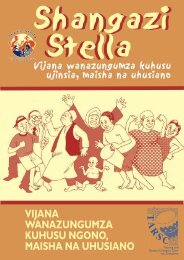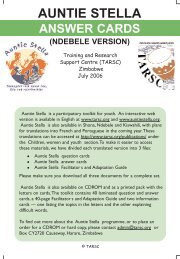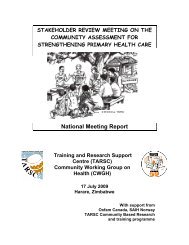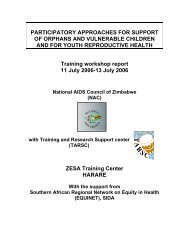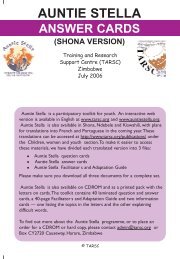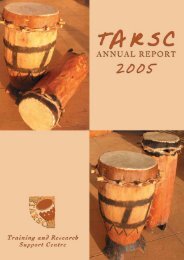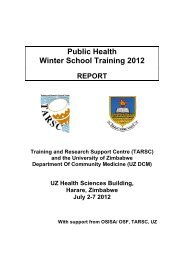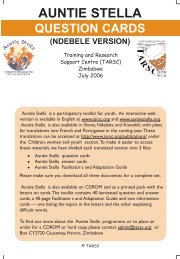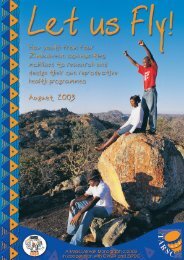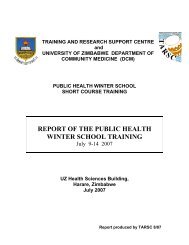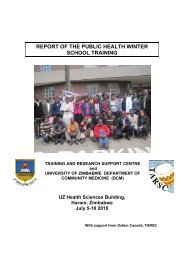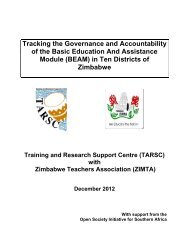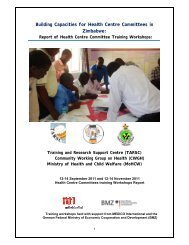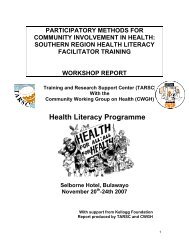HLregional meeting09.pdf - Training and Research Support Centre
HLregional meeting09.pdf - Training and Research Support Centre
HLregional meeting09.pdf - Training and Research Support Centre
You also want an ePaper? Increase the reach of your titles
YUMPU automatically turns print PDFs into web optimized ePapers that Google loves.
He highlighted that the facilitators’ training was carried out in four districts in Malawi, with 30<br />
facilitators trained in 2008. MHEN facilitators were drawn from member organizations in the<br />
academia, health institutes, health workers, <strong>and</strong> various governments’ institutions of Malawi.<br />
Community Health Literacy work began in 2008. <strong>Support</strong> <strong>and</strong> mentorship was collectively done by<br />
MHEN <strong>and</strong> TARSC from then to date. The facilitator’s review meeting was part of the on going<br />
support, mentorship, monitoring <strong>and</strong> evaluation of the Programme. The national review meeting was<br />
done in July 2009. Mr. Chikwapulo argued that the Malawi team faced some challenges in the<br />
process. Some of the clear challenges have been associated with inadequate financial resources to<br />
support local activities Vis a Vis the dem<strong>and</strong> for health Literacy at community level. He<br />
recommended the need to raise more resources to support some of the local health literacy activities<br />
while also encouraging Health Literacy facilitators to fund raise at local level. Mr. Saiti Chikwapulo<br />
further added that in order to enrich exchange of ideas <strong>and</strong> sharing of best practice it was important<br />
to support the exchange visit programme between <strong>and</strong> amongst implementing country partners in<br />
the region. Furthermore, The Health Literacy programme should also be viewed as a fundamental<br />
equity watchdog as it exposes unfair <strong>and</strong> unnecessary disparities at community level.<br />
4.3. Botswana<br />
Ms Nana Gleeson from BONELA gave an overview of the Health Literacy programme in Botswana.<br />
The Health Literacy programme was first introduced in Botswana in the year 2007 through TARSC<br />
<strong>and</strong> EQUINET. BONELA <strong>and</strong> BFTU had time to reflect <strong>and</strong> think through how health literacy could<br />
be implemented in Botswana <strong>and</strong> if they would be able to implement it at community level. The<br />
regional planning meeting of 2007 brought together Zimbabwe <strong>and</strong> Malawi (implementing country<br />
partners then) <strong>and</strong> Botswana <strong>and</strong> Mozambique (interested country partners then) to learn from the<br />
Zimbabwe <strong>and</strong> Malawi processes <strong>and</strong> see how implementation was being done <strong>and</strong> to use the<br />
learning from the processes to inform Health Literacy work in Botswana.<br />
Ms Nana argued that the Health Literacy programme is unique to Botswana in a number of ways. It:<br />
• Is a holistic approach that significantly supports the agenda of health systems strengthening<br />
• <strong>Support</strong>s communities with ability to underst<strong>and</strong>, communicate <strong>and</strong> use information to<br />
support action.<br />
• Gives BONELA a platform to fully advocate for pertinent grassroots issues at district level<br />
<strong>and</strong> at national level. Health literacy creates an opportunity to strengthen advocacy at district<br />
level.<br />
17



